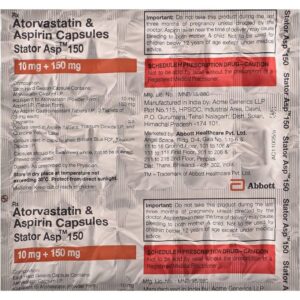ATORVASTIN AND ASPIRIN
ATORVASTIN AND ASPIRIN: Atorvastatin and Aspirin are two separate drugs often used together for the management of cardiovascular conditions, specifically to prevent the risk of heart attacks and strokes.
Atorvastatin belongs to a class of medications called statins, which are used to lower cholesterol levels in the body. It works by inhibiting an enzyme called HMG-CoA reductase, which is involved in the production of cholesterol in the liver. By blocking this enzyme, atorvastatin helps reduce the amount of cholesterol produced, leading to lower levels of “bad” LDL cholesterol in the bloodstream.
Aspirin is a nonsteroidal anti-inflammatory drug (NSAID) that has blood-thinning properties. It works by inhibiting the activity of an enzyme called cyclooxygenase (COX), which is responsible for the production of substances that promote inflammation, pain, and blood clot formation. Aspirin’s blood-thinning effect helps prevent blood clots from forming and reduces the risk of heart attacks and strokes.
The combination of atorvastatin and aspirin is typically prescribed for individuals with a high risk of cardiovascular events, such as those with a history of heart disease, stroke, or diabetes. It is used as part of a comprehensive treatment plan that includes lifestyle changes like a healthy diet, exercise, and quitting smoking.
The recommended dose of atorvastatin varies depending on the individual’s needs and cholesterol levels but typically ranges from 10 to 80 mg per day. Aspirin is usually taken in low doses of 81 mg per day or as directed by a healthcare professional.
As with any medication, atorvastatin and aspirin can have side effects. Common side effects of atorvastatin may include muscle pain or weakness, digestive issues, and an increased risk of developing type 2 diabetes. Less common but more serious side effects include liver problems and muscle damage, which could result in a condition called rhabdomyolysis.
Aspirin, especially in higher doses, can cause stomach bleeding, ulceration, or allergic reactions like rash and difficulty breathing. Long-term or excessive use of aspirin can also increase the risk of kidney problems and interfere with blood clotting.
It is important to note that these drugs may interact with other medications, so it is crucial to inform healthcare professionals about any other medications, supplements, or health conditions before starting the combination therapy.
Ultimately, atorvastatin and aspirin are prescribed together as part of a treatment plan to reduce the risk of heart attacks and strokes. The combination works synergistically to lower cholesterol levels and prevent blood clots. However, the use of these medications should always be supervised by a healthcare professional, taking into account an individual’s specific health needs and medical history.


